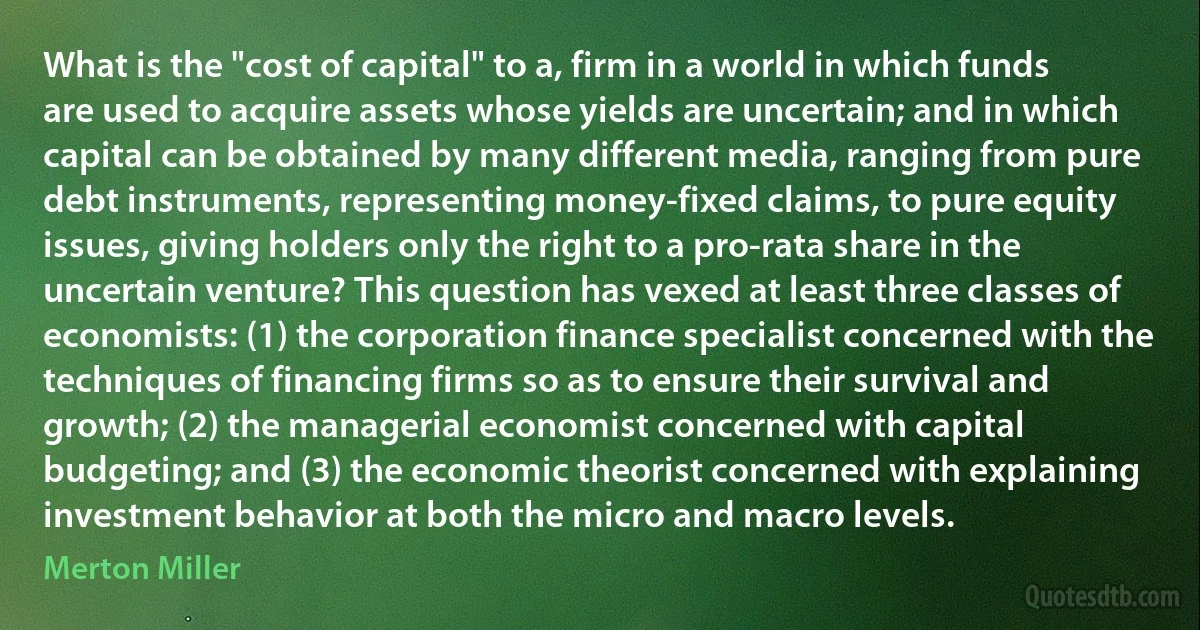
What is the "cost of capital" to a, firm in a world in which funds are used to acquire assets whose yields are uncertain; and in which capital can be obtained by many different media, ranging from pure debt instruments, representing money-fixed claims, to pure equity issues, giving holders only the right to a pro-rata share in the uncertain venture? This question has vexed at least three classes of economists: (1) the corporation finance specialist concerned with the techniques of financing firms so as to ensure their survival and growth; (2) the managerial economist concerned with capital budgeting; and (3) the economic theorist concerned with explaining investment behavior at both the micro and macro levels.
Merton MillerRelated topics
assets corporation cost debt different economist equity giving least media pure question ranging right share theorist three uncertain venture world funds macro micro budgeting financing representingRelated quotes
In my view-and that of most contemporary economists, I believe-Schumpeter's most original and most lastingly significant book was Theory of Economic Development, which appeared in 1911 (and was translated into English in 1934). It was at the University of Czernowitz, not far from the beginning of his career as an economist, that he worked out his conception of the entrepreneur, the maker of "new combinations,” as the driving force and characteristic figure of the fits-and-starts evolution of the capitalist economy. He was explicit that, while technological innovation was in the long run the most important function of the entrepreneur, organizational innovation in governance, finance, and management was comparable in significance.

Robert Solow
Writers after Coase have referred to the authority structure of the firm as a "visible hand" that works in combination with Smith's invisible hand. The everyday fact that employers exercise power over their employees - not news to most employees - had been a central theme in Marx's economics, but it was (and generally continues to be) overlooked by most neoclassical economists. Early in his studies Coase noted the similarity between the hierarchical organization of capitalist firms, with their reliance on command relations, and the then-existing system of centralized economic planning in the Communist countries, where production was carried out in accordance with orders from higher authorities and where market competition played little role.

Samuel Bowles
Let us recollect, that, under the constitution which we have derived from our ancestors, we have enjoyed more liberty, we have acquired more glory, we possess more character and power, than has hitherto fallen to the lot of any other country on the globe; and if there be any man yet undecided on this question, I entreat him that he will give the benefit of his doubt to the existing order of things,-and, that, before he gives his vote to a measure, of the consequences of which he is at least uncertain, he will weigh the substantial blessings which he knows to have been derived from the government that is, against all the speculative advantages which he is promised from the government that is to be.

Robert Peel
The monetary history of the last four hundred years has been replete with financial crises. The pattern was that investor optimism increased as economies expanded, the rate of growth of credit increased and economic growth accelerated, and an increasing number of individuals began to invest for short-term capital gains rather than for the returns associated with the productivity of the assets they were acquiring. The increase in the supply of credit and more buoyant economic outlook often led to economic booms as investment spending increased in response to the more optimistic outlook and the greater availability of credit, and as household spending increased as personal wealth surged.

Charles P. Kindleberger
Think of the firm as a gigantic tub of whole milk. The farmer can sell the whole milk as it is. Or he can separate out the cream, and sell it at a considerably higher price than the whole milk would bring. (Selling cream is the analog of a firm selling debt securities, which pay a contractual return.) But, of course, what the farmer would have left would be skim milk, with low butter-fat content, and that would sell for much less than whole milk. (Skim milk corresponds to the levered equity.) The Modigliani-Miller proposition says that if there were no cost of separation (and, of course, no government dairy support program), the cream plus the skim milk would bring the same price as the whole milk.

Merton Miller
